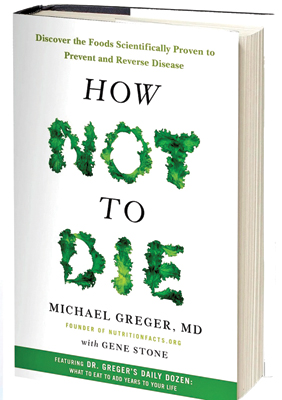I know two identical twins who agree on everything except their diet! One is vegan and the other is a heavy meat eater! While one twin aggressively supports veganism on social media platforms, the other counters, saying, “You cannot save the planet by sticking to a plant-based diet and you are being so silly.” So can we expect everyone to be the same if even identical twins aren’t? Some choose to be vegetarians whereas others stick to their meat-based diets.
The top three reasons for switching to a plant-based diet are concern for animals, the planet, and one’s own good health.
World Vegan Day

Dr Michael Greger
Every year on November 1, World Vegan Day is observed. Veganism, a compassionate lifestyle that abstains from all animal abuse and exploitation, is promoted on World Vegan Day.
The World Vegan Day was established in 1994 by the vegan animal rights activist Louise Wallis who was the then President of The Vegan Society. Wallis suggested November 1 as World Vegan Day to commemorate The Vegan Society’s 50th anniversary and was particular to choose the first day of November as the day to celebrate World Vegan Day as it falls between Halloween and Mexican Day of the Dead.
Research
Several in-depth recent studies have shown that a vegan diet significantly reduces environmental impact. A very comprehensive 2023 research study based in the UK shows that plant diets result in 75 percent less climate-heating emissions, water pollution, and land use than meat-rich diets.
According to Prof. Peter Scarborough of the University of Oxford who led the research “Our dietary choices have a big impact on the planet. Cutting down the amount of meat and dairy in your diet can make a big difference to your dietary footprint.”

Ashley Fruno
As emphasised by the senior professors who conducted this research, “diets enabling global food production to be sustainable would mean people in rich nations “radically” reducing meat and dairy consumption.” They also said that alternative strategies, such as implementing new technology and minimising food waste, would not be sufficient to lessen the environmental impact of the food system.
Being a vegetarian could be linked to genetics
People who want to follow a vegetarian diet are sometimes unsuccessful as they tend to revert to their former meat-inclusive diets after struggling for months or even years. One cause could be research or publications that advocate meat-based diets and emphasise that meat is necessary for healthy living.
More and more people are choosing a vegetarian diet for moral, ethical, or health-related reasons. The physiologic effects of particular foods, an individual’s metabolism, and personal preferences can all influence these dietary choices/decisions.
However, there has been little research regarding the influence that genetics may have on these dietary decisions. To address this gap, a group of researchers led by experts from Northwestern University in the US conducted an extensive study recently (the UK Biobank study) that compared the genes of 5,324 strict vegetarians to those of 329,455 non-vegetarians.
According to this study, being a vegetarian may also be influenced by one’s genes. Thirty four genes have been identified by scientists to be possibly linked to vegetarianism. 3 of these genes appeared to be significantly linked with a vegetarian diet, while the remaining 31 were found to be ‘possibly’ associated.
 Given the links to genes, it’s possible that certain individuals are “hard-wired” to be vegetarians, the study observes.
Given the links to genes, it’s possible that certain individuals are “hard-wired” to be vegetarians, the study observes.
As the authors of the Research have mentioned in PlOS ONE journal, “several of the genes associated with vegetarianism have ‘important functions in lipid (fat) metabolism and brain function’.
The conclusion reached, well supported by data was “that adherence to a strict vegetarian diet is influenced by genetics.”
How Not to Die
Dr Michael Greger’s internationally best-selling book How Not To Die offers practical and scientifically-proven nutritional advice to keep any ailment, especially non-communicable diseases at bay. Most importantly Dr. Greger reveals the amazing health benefits our simple dietary choices can offer. The book, which contains more than 120 excellent plant-based (meal, snack, and beverage) recipes, should be on the shelf of any vegetarian or health-conscious individual.
Aim for 80 percent of your diet to be plant-based if you find it difficult to follow it 100 percent of the time. With confidence and science to support his facts, Dr. Greger argues, “Any movement towards more plants and fewer animal products [and processed foods] can improve your health!”
Dr. Greger also shares the accounts of patients who had miraculously recovered from grave sicknesses after adopting a plant-based diet.
As stated in the Introduction of How Not To Die “Eating healthfully is not about vegetarianism, veganism, or any other “-ism,”
Dr. Greger said “From a nutrition standpoint, the reason I don’t like the terms vegetarian and vegan is that they are defined by what you don’t eat. Too often I meet vegans who proudly tell me about their animal-free diet … which seems to be composed primarily of french fries, fake meat, and non dairy ice cream. That menu may be vegan, but it isn’t particularly health-promoting. This is why I prefer the term whole-food, plant-based nutrition.”
According to Dr. Greger, the healthiest diet is one that limits the consumption of meat, eggs, dairy, and processed junk while increasing the consumption of fruits, vegetables, legumes (beans, split peas, chickpeas, and lentils), whole grains, nuts and seeds, mushrooms, and herbs and spices—basically, real food that grows out of the ground.
Whole food means the types of food that are not overly processed – nothing bad has been added, and nothing good has been taken away.
The ‘Daily Dozen’ Dr. Greger recommends for everyone are beans, berries, other fruits, cruciferous vegetables, greens, other vegetables, flaxseeds, nuts and seeds, herbs and spices, whole grains, beverages and of course exercise!
PETA’s role
People for the Ethical Treatment of Animals (PETA)’s motto, which states “animals are not for us to eat,” reflects PETA’s unwavering commitment to advocating for a vegan lifestyle, excluding any consumption of animal products, including eggs and milk.
“Investigations consistently reveal the stark reality of these industries. When profit becomes the primary concern, there is no room left for ensuring the welfare and ethical treatment of animals,”says PETA Asia’s Animal Assistance Programs Director, Ashley Fruno.
Fruno went into more detail about how PETA promotes its Zero Cruelty Towards Animals campaign.
“PETA promotes a vegan lifestyle through impactful investigation videos, public education and outreach, and attention-grabbing demonstrations. Our aim is to demonstrate to the public that a vegan lifestyle is not only animal-friendly but also highly beneficial for one’s health. We also emphasise the significant environmental impact of consuming animal products. According to the United Nations, a worldwide transition to vegan eating is imperative to mitigate the severe consequences of climate change.
Research supports this claim, indicating that widespread adoption of veganism could potentially reduce global greenhouse gas emissions from food by a remarkable 70 percent by 2050.”
Fruno is positive about the nutritional adequacy of plant-based diets.
“Many reputable studies, including research from esteemed organisations such as the ADA (American Dietetic Association) and the PCRM (Physicians Committee for Responsible Medicine), consistently affirm that a balanced vegan diet fulfills all essential nutritional requirements. This includes crucial elements like protein, iron, vitamins, and minerals,” she said.
Additionally, research indicates that adopting a vegan lifestyle is associated with a reduced risk of obesity, strokes, heart disease, and diabetes, underscoring the substantial health benefits linked to vegan nutrition.
Farm animals endure great suffering throughout their lives, as is frequently noted, just to be brutally killed at the end. So, if we wish to put an end to animal cruelty, we must either cut our meat consumption or become vegetarians.
Elaborating on PETA’s most recent achievements in terms of veganism promotion, Fruo said that in just a decade, the term “veganism” has transformed from a relatively new concept into a powerful and influential presence in our society. “A mere 10 years ago, vegan options on flights were virtually unheard of, but today, they’re available on every airline and PETA can list the top 10 vegan-friendly cities in Asia. During the pandemic, plant-based products like Beyond Meat and Omnipork gained significant traction among the general public, reflecting the growing demand for meat alternatives. Now, prominent organisations, including the United Nations, have recognised vegan diets as an ideal means to combat climate change. These remarkable changes can be attributed to the unwavering and consistent efforts of PETA and other organisations in advocating for a more sustainable and compassionate way of living,” Fruno noted.









